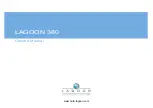
Cobalt_OM_preprint_shell.fm Page 1 Wednesday, March 1, 2006 5:39 AM
26SD Owner’s Manual
3
-
5
O
PERATING
I
NFORMATION
LAUNCHING
Launching Checklist
Federal and local laws require certain safety
equipment to be onboard at all times. In addition,
responsible boaters carry other equipment in case
of an emergency. Check with local boating
authorities for any additional requirements over and
above federal requirements.
For maximum enjoyment and safety, check each of
these items BEFORE launching:
• Install drain plug.
• Have enough personal flotation devices for
every person onboard.
• Be sure the steering system operates smoothly
and properly.
• Verify the amount of fuel in the fuel tanks.
• Verify the batteries are fully charged.
• Check weather conditions.
• Be sure the lights, horn, bilge pumps and other
electrical equipment are in proper operating
condition.
• Be sure the fire extinguisher, signaling devices
and other emergency gear are onboard and in
proper operating condition.
On the Water
Start your engine before casting off. Remember,
the boat turns from the stern. Allow plenty of space
between the boat and the dock before trying to
move away.
Boarding
When boarding the boat, always step in. Do not
jump. Avoid stepping on fiberglass or other
potentially slippery surfaces. Board one person at a
time.
Do not board the boat while carrying gear. Set the
gear on the dock, board the boat and then pick up
the gear.
Loading
Do not overload your boat. The performance of
your boat is dependent on load weight and
distribution. Passengers should distribute
themselves to maintain trim. Remember to
distribute weight from right to left, and also from
front to back.
• Avoid excess weight in the bow or stern.
• Securely stow all extra gear in stowage areas
to prevent load shifting. Do not stow gear on top
of safety equipment; safety equipment must be
quickly accessible.
• In adverse weather, reduce the load in the boat.
People/load capacity ratings are based upon
normal boating conditions.
• Do not use the drive unit as a boarding ramp;
use the boarding ladder. To prevent injury,
make sure the engine is off when swimmers,
divers and skiers are boarding.
Overloading of passengers, personal equipment
and supplies could result in an accident, especially
in rough waters. Maintain a balanced load at all
times.
Shipshape
Keep the weight distributed evenly. Store all gear in
secure areas. Safety equipment must be
immediately accessible at all times.
A
DANGER
Avoid injury or death. All passengers
should be carefully seated while the
boat is moving. DO NOT sit on the bow,
bow pulpit, deck, gunwale or sundeck
pads when the boat is moving.
















































